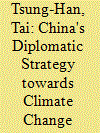| Srl | Item |
| 1 |
ID:
172285


|
|
|
|
|
| Summary/Abstract |
This article investigates Beijing's new policy in its domestic implementations and international negotiations on climate change in the post-Paris Agreement era. As the 2015 Paris Agreement is an implementing agreement under the United Nations Framework Convention on Climate Change (UNFCCC), China's signature and ratification, as the country is the world's largest emitter of carbon dioxide, are critical not only to the entry into force of the Paris Agreement, but also to its exercise of obligations and influence in climate diplomacy. Reviewing China's National Policy on climate change, this article considers that China has not only planned its strategy to incorporate "global energy interconnection" in "One Belt, One Road" Initiatives a part of China's global energy reform, but also announced its 2030 Agenda as its low-carbon road map to fight climate change, both of which echo the aims of the Paris Agreement regarding "mitigation, adaptation, loss and damage, financial support, capacity-building, and technical facilitation".
|
|
|
|
|
|
|
|
|
|
|
|
|
|
|
|
| 2 |
ID:
123757


|
|
|
|
|
| Publication |
2013.
|
| Summary/Abstract |
Diplomatic power and influence, coexistence-style, concerns the ability to determine the framework governing international security management. It requires a programme for international order that devises methods on how to manage the use of force, jurisdiction over peoples and territory and international agreements. China's diplomatic strategy is based on its constitutional concept of peaceful coexistence. This concept has been translated into a programme for order that involves governmental consent, United Nations' (UN) authorisation and approval from regional or functional UN-based organisations as a requirement for using force; effective control and respect for the legal equality of states as a precondition for exercising jurisdiction over peoples and territory; and absolute sovereignty as a basis for the validity of international agreements. The dominant element of Beijing's strategy is coexistence diplomacy, which has allowed China to become a maker of international order.
|
|
|
|
|
|
|
|
|
|
|
|
|
|
|
|